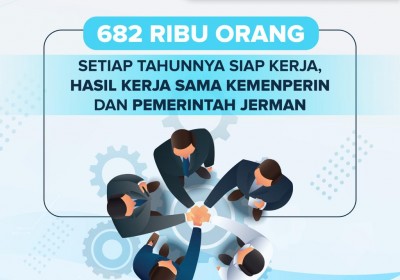Indonesia Partners with Germany and Switzerland to Help Train Vocational Instructors
October 22, 2021
JAKARTA – In order to provide competent human resources and workers that meet industry criteria, the government has held Master Trainer work training programs for various workplaces in Indonesia, in collaboration with the German and Swiss governments.
“This program shows the strength of our relations and partnership with governments that have been at the forefront of implementing effective vocational education and training programs, such as Germany and Switzerland,” said Industry Minister (Menperin) Agus Gumiwang Kartasasmita in an official statement on Tuesday (28/9).
The Industry Ministry’s (Kemenperin) cooperation with the German government relates to technical-based vocational training and has been going on since 2001. The strength and success of the collaboration has borne fruit as it has helped strengthen the Kemenperin’s education and training units. As a result of this collaboration, the government has succeeded in producing competent and work-ready graduates and workers that meet the needs of the industrial sector, producing 682,000 workers every year.
The Master Trainer training program is an implementation of the Link and Match program led by the Kemenperin’s Industrial Human Resources Development Agency.
“With the Master Trainer training program, we hope that the competence of instructors in the workplace can increase, because instructors hold a very important and dominant role in guiding the trainees to work in order to achieve competence and become workplace-ready,” Minister Agus said.
Within the program, the Kemenperin also facilitated the use of the Indonesian language translation module for the first time. This move is expected to support the learning process and help produce more workplace instructors in the industry.
The Kemenperin also continues to collaborate with representatives of the German and Swiss governments through the Deutsche Gesselschaft fur Internationale Zusammenarbeit and the Swiss State Secretariat for Economic Cooperation in adopting a dual education system that is applied in nine vocational high schools (SMK) and 12 higher education institutes that are run under the Kemenperin’s Resources Development Agency (BPSDMI).
“I also want to continue to invite the Indonesian ambassadors to Germany and Switzerland to help bridge the cooperation between education and vocational training units in Indonesia in order to go international,” the Minister explained.
Indonesia’s Ambassador to Switzerland and Liechtenstein Muliaman Dharmansyah Hadad are committed to supporting the Indonesian government’s efforts to improve professional skills through vocational education in order to reduce the country’s unemployment rate so that the Indonesian economy can improve and strengthen.
According to him, Switzerland is one of the countries that has long supported and helped improve vocational education quality in Indonesia and Indonesia-Switzerland relations have consistently been at a high on both the governmental level and the business level, as well as people-to-people relations.
“Currently, Indonesia and Switzerland are also in the process of signing the Young Professional Agreement. The signing of this agreement is expected to occur in the near future so that the entry into force can begin by November 2021,” he added.
Meanwhile, the Indonesian Ambassador to Germany Arif Havas Oegroseno voiced his support towards the Master Trainer program and lauded it as one of the more significant efforts to implement a dual education system in Indonesia’s vocational schools. “This system has so far been implemented very effectively in Germany,” he noted.
One of the strengths of the German economy so far has been its unmitigated support of its small and medium sized industries (IKM) and businesses, which are supported by the availability of skilled labor in a fairly even and standardized quality and quantity.
“Hundreds of MoUs are signed every year between schools and industries/businesses in Germany because industrial involvement in vocational activities are considered to be an investment,” Havas added.
*****
Indonesia’s Research Institutions Supporting the Development of the Electric Vehicle Industry
Indonesian Muslim Fashion and Cosmetics IKMs Shine at Dubai World Expo 2020
Govt Steps Up UMKM Transformation Efforts in the Midst of Pandemic Slowdown
Govt Encourages Promotion of IKM Products in Digital Era
Government Begins Developing Maritime Training Center in Makassar
Tweets by IDDevForum
